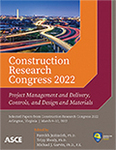Mitigating the Winner’s Curse Dilemma in Multi-Stage Construction Bidding
Publication: Construction Research Congress 2022
ABSTRACT
The global and national spending on public infrastructure projects continues to increase tremendously. Accordingly, contractors need to adopt efficient bidding strategies to cope with the legal requirement of competitive bidding within the public infrastructure projects. Moreover, contractors usually acquire the services of subcontractors to handle large projects. However, despite the previous research efforts on developing bidding models, there is still a lack of research that tackles the multi-stage construction bidding, where subcontractors submit quotations/bids first and general contractors bid second for the whole project. As such, this paper aims to develop a game-theoretic bidding model for multi-stage construction bidding. To this end, the authors utilized an interrelated methodology comprised of: (1) investigating existing bidding models that are based on a game theory approach; (2) deriving of a bid function for the multi-stage construction bidding following the low bid method where the lowest bidder is the winner; (3) simulating multi-stage bidding environment; and (4) validating the derived bid function and simulation model utilizing data of 808 US public infrastructure projects. Results indicate that the derived bid function gives general contractors a competitive advantage by reducing the occurrence and magnitude of earning negative profits (known as the winner’s curse) while winning a reasonable number of projects; and hence, resulting in a higher expected profit. Ultimately, this study adds to the body of knowledge by providing a bidding model for the multi-stage construction bidding that shall aid contractors in dealing with the uncertainties within the associated decision-making process.
Get full access to this article
View all available purchase options and get full access to this chapter.
REFERENCES
Abotaleb, I., and El-Adaway, I. H. (2017). Construction Bidding Markup Estimation Using a Multistage Decision Theory Approach. Journal of Construction Engineering and Management, 143(1): 04016079.
Ahmed, M. O. (2015). Construction bidding and the winner’s curse. Master’s Thesis. Civil and Environmental Engineering Dept, Mississippi State University, Mississippi, USA. http://sun.library.msstate.edu/ETD-db/theses/available/etd-03252015-173319/.
Ahmed, M. O., El-Adaway, I. H., Coatney, K. T., and Eid, M. S. (2015). Multi-stage bidding for construction contracts: a game theory approach. In Proc., 5th International/ 11th Construction Specialty Conference, Vancouver, British Columbia.
Ahmed, M. O., El-Adaway, I. H., Coatney, K. T., and Eid, M. S. (2016). Construction bidding and the winner’s curse: Game theory approach. Journal of Construction Engineering and Management, 142(2): 04015076.
Ahmed, M. O., Khalef, R., Ali, G. G., and El-Adaway, I. H. (2021). Evaluating Deterioration of Tunnels Using Computational Machine Learning Algorithms. Journal of Construction Engineering and Management, 147(10): 04021125.
Assaad, R., Ahmed, M. O., El-Adaway, I. H., Elsayegh, A., and Nadendla, V. S. S. (2021). Comparing the Impact of Learning in Bidding Decision-Making Processes Using Algorithmic Game Theory. Journal of Management in Engineering, 37(1): 04020099.
Awwad, R., Asgari, S., and Kandil, A. (2015). Developing a virtual laboratory for construction bidding environment using agent-based modeling. Journal of Computing in Civil Engineering, 29(6), 04014105.
De Clerck, D., and Demeulemeester, E. (2016). Creating a more competitive PPP procurement market: Game theoretical analysis. Journal of Management in Engineering, 32(6), 04016015.
Dyer, D., and Kagel, J. H. (1996). Bidding in Common Value Auctions: How the Commercial Construction Industry Corrects for the Winner’s Curse. Management Science, 42(10), 1463–1474.
Dyer, D., Kagel, J. H., and Levin, D. (1989). A comparison of naive and experienced bidders in common value offer auctions: A laboratory analysis. The Economic Journal, 99(394), 108–115.
Friedman, L. (1956). A competitive-bidding Strategy. Operations Research, 4(1), 104–112.
Goeree, J. K., and Offerman, T. (2002). Efficiency in Auctions with Private and Common Values: Experimental Study. The American Economic Review, 92(3), 625–643.
Ioannou, P. G., and Awwad, R. E. (2010). Below-Average Bidding Method. Journal of Construction Engineering and Management, 136(9), 936–946.
Kardes, I., Ozturk, A., Cavusgil, S. T., and Cavusgil, E. (2013). Managing Global Megaprojects: Complexity and Risk Management. International Business Review, 22(6): 905–917.
Laffont, J. (1997). Game theory and empirical economics: the case of auction data. European Economic Review, 41, 1–35.
Lew, Y. L., Hassim, S., Muniady, R., and Law, T. H. (2018). Structural equation modelling for subcontracting practice: Malaysia chapter. Engineering, Construction and Architectural Management, 25(7): 835–860.
Myerson, R. B. (1991). Game Theory: Analysis of Conflict. Harvard University Press, Cambridge, MA., USA.
Nichols, J. (2018). Reverse Auction Bidding: Studying Player Behavior. Journal of Construction Engineering and Management, 144(1), 04017095.
Rastegar, H., Arbab Shirani, B., Mirmohammadi, S. H., and Akhondi Bajegani, E. (2021). Stochastic Programming Model for Bidding Price Decision in Construction Projects. Journal of Construction Engineering and Management, 147(4), 04021025.
Sevier, C. (2021). President Biden Unveils Infrastructure Plan. ASCE 2021 Report Card for America’s Infrastructure. https://infrastructurereportcard.org/president-biden-unveils-infrastructure-plan/ (May 05, 2021).
Tam, V. W., Shen, L., and Kong, J. S. (2011). Impacts of multi-layer chain subcontracting on project management performance. International Journal of Project Management, 29(1), 108–116.
US General Services Administration. 2016. Bidding on Federal Construction Projects. https://www.gsa.gov/real-estate/real-estate-services/for-businesses-seeking-opportunities/bidding-on-federal-construction-projects (Accessed May 05, 2021).
Viewpoint. (2020). COVID-19 Survey: How the construction industry is adapting. https://info.viewpoint.com/rs/623-NDA-487/images/COVID_Survey_Results.pdf (Accessed May 05, 2021).
Information & Authors
Information
Published In
History
Published online: Mar 7, 2022
Authors
Metrics & Citations
Metrics
Citations
Download citation
If you have the appropriate software installed, you can download article citation data to the citation manager of your choice. Simply select your manager software from the list below and click Download.
